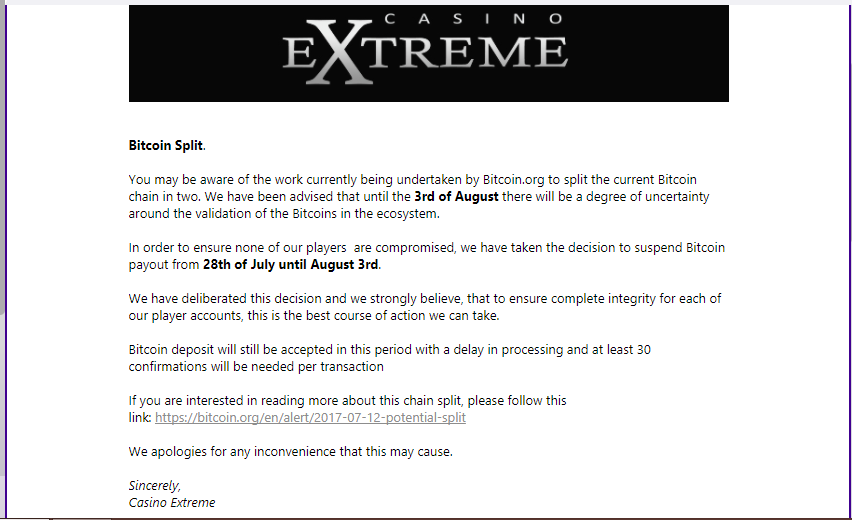Search the Community
Showing results for tags 'Cryptocurrency'.
-
Some stop playing when the charts turn red (like what is going on now), while others see it as the perfect time to stay active. Volatility affects mindset, not just portfolios. What’s your approach when the market dips, do you keep spinning & betting on sports or you stop playing for a while?
- 5 replies
-
- crypto casino
- online casino
-
(and 2 more)
Tagged with:
-
So, you may or may not have checked your email this afternoon but I've just had one off Skril to say they're now accepting cryptocurrency. You can buy and sell instantly from 40 flat currencies to Bitcoin, Bitcoin Cash, Litecoin or Ether. Am I right in thinking then, once you've excganged it back to your account currency you can just use it as normal money then? Also I thought bitcoin was anonomys, is it not when you're buying and selling through Skrill?
- 20 replies
-
This is a contributed post by Bill Harris, former CEO of Intuit and founding CEO of PayPal and Personal Capital. I’m tired of saying, “Be careful, it’s speculative.” Then, “Be careful, it’s gambling.” Then, “Be careful, it’s a bubble.” Okay, I’ll say it: Bitcoin is a scam. In my opinion, it’s a colossal pump-and-dump scheme, the likes of which the world has never seen. In a pump-and-dump game, promoters “pump” up the price of a security creating a speculative frenzy, then “dump” some of their holdings at artificially high prices. And some cryptocurrencies are pure frauds. Ernst & Young estimates that 10 percent of the money raised for initial coin offerings has been stolen. The losers are ill-informed buyers caught up in the spiral of greed. The result is a massive transfer of wealth from ordinary families to internet promoters. And “massive” is a massive understatement — 1,500 different cryptocurrencies now register over $300 billion of “value.” It helps to understand that a bitcoin has no value at all. Promoters claim cryptocurrency is valuable as (1) a means of payment, (2) a store of value and/or (3) a thing in itself. None of these claims are true. 1. Means of Payment. Bitcoins are accepted almost nowhere, and some cryptocurrencies nowhere at all. Even where accepted, a currency whose value can swing 10 percent or more in a single day is useless as a means of payment. 2. Store of Value. Extreme price volatility also makes bitcoin undesirable as a store of value. And the storehouses — the cryptocurrency trading exchanges — are far less reliable and trustworthy than ordinary banks and brokers. 3. Thing in Itself. A bitcoin has no intrinsic value. It only has value if people think other people will buy it for a higher price — the Greater Fool theory. Cryptocurrency is best-suited for one use: Criminal activity. Because transactions can be anonymous — law enforcement cannot easily trace who buys and sells — its use is dominated by illegal endeavors. Most heavy users of bitcoin are criminals, such as Silk Road and WannaCry ransomware. Too many bitcoin exchanges have experienced spectacular heists, such as NiceHash and Coincheck, or outright fraud, such as Mt. Gox and Bitfunder. Way too many Initial Coin Offerings are scams — 418 of the 902 ICOs in 2017 have already failed. Hackers are getting into the act. It’s estimated that 90 percent of all remote hacking is now focused on bitcoin theft by commandeering other people’s computers to mine coins. Even ordinary buyers are flouting the law. Tax law requires that every sale of cryptocurrency be recorded as a capital gain or loss and, of course, most bitcoin sellers fail to do so. The IRS recently ordered one major exchange to produce records of every significant transaction. And yet, a prominent Silicon Valley promoter of bitcoin proclaims that “Bitcoin is going to transform society ... Bitcoin’s been very resilient. It stayed alive during a very difficult time when there was the Silk Road mess, when Mt.Gox stole all that Bitcoin ...” He argues the criminal activity shows that bitcoin is strong. I’d say it shows that bitcoin is used for criminal activity. Bitcoin transactions are sometimes promoted as instant and nearly free, but they’re often relatively slow and expensive. It takes about an hour for a bitcoin transaction to be confirmed, and the bitcoin system is limited to five transactions per second. MasterCard can process 38,000 per second. Transferring $100 from one person to another costs about $6 using a cryptocurrency exchange, and well less than $1 using an electronic check. Bitcoin is absurdly wasteful of natural resources. Because it is so compute-intensive, it takes as much electricity to create a single bitcoin — a process called “mining” — as it does to power an average American household for two years. If bitcoin were used for a large portion of the world’s commerce (which won’t happen), it would consume a very large portion of the world’s electricity, diverting scarce power from useful purposes. All of this would be a comic sideshow if innocent people weren’t at risk. But ordinary people are investing some of their life savings in cryptocurrency. One stock brokerage is encouraging its customers to purchase bitcoin for their retirement accounts! Source: https://www.recode.net/2018/4/24/17275202/bitcoin-scam-cryptocurrency-mining-pump-dump-fraud-ico-value
- 10 replies
-
- Bitcoin
- Cryptocurrency
-
(and 1 more)
Tagged with:
-
There are so many of you that do not actually know how Bitcoin first came to life, or what cryptocurrency is, or what Blockchain is all about, so here’s a very interesting abstract from ‘Beyond the Bitcoin Bubble’: You can read the entire long article at this link from The New York Times Magazine: https://www.nytimes.com/2018/01/16/magazine/beyond-the-bitcoin-bubble.html?utm_source=pocket&utm_medium=email&utm_campaign=pockethits By STEVEN JOHNSON JAN. 16, 2018 layer innocent nothing argue pottery winner cotton menu task slim merge maid The sequence of words is meaningless: a random array strung together by an algorithm let loose in an English dictionary. What makes them valuable is that they’ve been generated exclusively for me, by a software tool called MetaMask. In the lingo of cryptography, they’re known as my seed phrase. They might read like an incoherent stream of consciousness, but these words can be transformed into a key that unlocks a digital bank account, or even an online identity. It just takes a few more steps. On the screen, I’m instructed to keep my seed phrase secure: Write it down, or keep it in a secure place on your computer. I scribble the 12 words onto a notepad, click a button and my seed phrase is transformed into a string of 64 seemingly patternless characters: 1b0be2162cedb2744d016943bb14e71de6af95a63af3790d6b41b1e719dc5c66 This is what’s called a “private key” in the world of cryptography: a way of proving identity, in the same, limited way that real-world keys attest to your identity when you unlock your front door. My seed phrase will generate that exact sequence of characters every time, but there’s no known way to reverse-engineer the original phrase from the key, which is why it is so important to keep the seed phrase in a safe location. That private key number is then run through two additional transformations, creating a new string: 0x6c2ecd6388c550e8d99ada34a1cd55bedd052ad9 That string is my address on the Ethereum blockchain. Ethereum belongs to the same family as the cryptocurrency Bitcoin, whose value has increased more than 1,000 percent in just the past year. Ethereum has its own currencies, most notably Ether, but the platform has a wider scope than just money. You can think of my Ethereum address as having elements of a bank account, an email address and a Social Security number. For now, it exists only on my computer as an inert string of nonsense, but the second I try to perform any kind of transaction — say, contributing to a crowdfunding campaign or voting in an online referendum — that address is broadcast out to an improvised worldwide network of computers that tries to verify the transaction. The results of that verification are then broadcast to the wider network again, where more machines enter into a kind of competition to perform complex mathematical calculations, the winner of which gets to record that transaction in the single, canonical record of every transaction ever made in the history of Ethereum. Because those transactions are registered in a sequence of “blocks” of data, that record is called the blockchain. The whole exchange takes no more than a few minutes to complete. From my perspective, the experience barely differs from the usual routines of online life. But on a technical level, something miraculous is happening — something that would have been unimaginable just a decade ago. I’ve managed to complete a secure transaction without any of the traditional institutions that we rely on to establish trust. No intermediary brokered the deal; no social-media network captured the data from my transaction to better target its advertising; no credit bureau tracked the activity to build a portrait of my financial trustworthiness. The first hint of a meaningful challenge to the closed-protocol era arrived in 2008, not long after Zuckerberg opened the first international headquarters for his growing company. A mysterious programmer (or group of programmers) going by the name Satoshi Nakamoto circulated a paper on a cryptography mailing list. The paper was called “Bitcoin: A Peer-to-Peer Electronic Cash System,” and in it, Nakamoto outlined an ingenious system for a digital currency that did not require a centralized trusted authority to verify transactions. At the time, Facebook and Bitcoin seemed to belong to entirely different spheres — one was a booming venture-backed social-media start-up that let you share birthday greetings and connect with old friends, while the other was a byzantine scheme for cryptographic currency from an obscure email list. But 10 years later, the ideas that Nakamoto unleashed with that paper now pose the most significant challenge to the hegemony of InternetTwo giants like Facebook. The paradox about Bitcoin is that it may well turn out to be a genuinely revolutionary breakthrough and at the same time a colossal failure as a currency. As I write, Bitcoin has increased in value by nearly 100,000 percent over the past five years, making a fortune for its early investors but also branding it as a spectacularly unstable payment mechanism. The process for creating new Bitcoins has also turned out to be a staggering energy drain. History is replete with stories of new technologies whose initial applications end up having little to do with their eventual use. All the focus on Bitcoin as a payment system may similarly prove to be a distraction, a technological red herring. Nakamoto pitched Bitcoin as a “peer-to-peer electronic-cash system” in the initial manifesto, but at its heart, the innovation he (or she or they) was proposing had a more general structure, with two key features. First, Bitcoin offered a kind of proof that you could create a secure database — the blockchain — scattered across hundreds or thousands of computers, with no single authority controlling and verifying the authenticity of the data. Second, Nakamoto designed Bitcoin so that the work of maintaining that distributed ledger was itself rewarded with small, increasingly scarce Bitcoin payments. If you dedicated half your computer’s processing cycles to helping the Bitcoin network get its math right — and thus fend off the hackers and scam artists — you received a small sliver of the currency. Nakamoto designed the system so that Bitcoins would grow increasingly difficult to earn over time, ensuring a certain amount of scarcity in the system. If you helped Bitcoin keep that database secure in the early days, you would earn more Bitcoin than later arrivals. This process has come to be called “mining.” The blockchain world proposes something different. Imagine some group like Protocol Labs decides there’s a case to be made for adding another “basic layer” to the stack. Just as GPS gave us a way of discovering and sharing our location, this new protocol would define a simple request: I am here and would like to go there. A distributed ledger might record all its users’ past trips, credit cards, favorite locations — all the metadata that services like Uber or Amazon use to encourage lock-in. Call it, for the sake of argument, the Transit protocol. The standards for sending a Transit request out onto the internet would be entirely open; anyone who wanted to build an app to respond to that request would be free to do so. Cities could build Transit apps that allowed taxi drivers to field requests. But so could bike-share collectives, or rickshaw drivers. Developers could create shared marketplace apps where all the potential vehicles using Transit could vie for your business. When you walked out on the sidewalk and tried to get a ride, you wouldn’t have to place your allegiance with a single provider before hailing. You would simply announce that you were standing at 67th and Madison and needed to get to Union Square. And then you’d get a flurry of competing offers. You could even theoretically get an offer from the M.T.A., which could build a service to remind Transit users that it might be much cheaper and faster just to jump on the 6 train. Like the original internet itself, the blockchain is an idea with radical — almost communitarian — possibilities that at the same time has attracted some of the most frivolous and regressive appetites of capitalism. We spent our first years online in a world defined by open protocols and intellectual commons; we spent the second phase in a world increasingly dominated by closed architectures and proprietary databases. We have learned enough from this history to support the hypothesis that open works better than closed, at least where base-layer issues are concerned. But we don’t have an easy route back to the open-protocol era. Some messianic next-generation internet protocol is not likely to emerge out of Department of Defense research, the way the first-generation internet did nearly 50 years ago. Yes, the blockchain may seem like the very worst of speculative capitalism right now, and yes, it is demonically challenging to understand. But the beautiful thing about open protocols is that they can be steered in surprising new directions by the people who discover and champion them in their infancy. Right now, the only real hope for a revival of the open-protocol ethos lies in the blockchain. Whether it eventually lives up to its egalitarian promise will in large part depend on the people who embrace the platform, who take up the baton, as Juan Benet puts it, from those early online pioneers. If you think the internet is not working in its current incarnation, you can’t change the system through think-pieces and F.C.C. regulations alone. You need new code.
- 8 replies
-
- Bitcoin
- Blockchain
-
(and 2 more)
Tagged with:
-
WinADay Casino added the romantic Phantom of the Opera slot game today! (It comes from its partner site, Slotland). Based on one of the greatest love stories ever told, the new 5x4 30 payline slot has a choice of generous bonus features and a wide betting range to appeal to all kinds of players. Beginning Friday, if you've made at least one deposit you're eligible for a $15 Freebie to try the new game. WinADay also added a popular new cryptocurrency option this week: Litecoin. (scroll down for Litecoin bonus offer) Inspired by Andrew Lloyd Webber’s spellbinding musical, the Phantom of the Opera slot game takes players on a romantic journey backstage at the Paris Opera House. The Phantom of the Opera slot has 30 fixed paylines. Players can wager from just three cents per spin up to the max bet of 1500 coins ($15). Three or more of the Free Spin scatter symbols trigger a choice of three bonus games, some awarding maximum free spins and others with fewer free spins but bigger win multipliers. With four rather than the typical three rows on its reels, the Phantom of the Opera slot has more opportunities for winning combinations than most online slot games. PHANTOM OF THE OPERA SLOT - INTRODUCTORY BONUSES These bonuses, available February 23 until March 1, 2018, are valid for playing the new Phantom of the Opera slot only: $15 Freebie Bonus code: 15FREEBIE Wagering requirement: 25X; max cashout 7X. 133% Deposit Bonus Deposits of $40 - $200 Bonus code: PHANTOM Wagering requirement: 35X. Last summer, WinADay added Bitcoins to its options for deposits and withdrawals. This month the unique casino begins offering another cryptocurrency option. Like Bitcoins, Litecoins are an easy and secure way to make deposits and collect winnings but transactions are even faster and with vastly reduced fees. Litecoins can be purchased through most major cryptocurrency exchanges including Okex and Kraken, or follow Winaday’s own guide. For the whole week, WinADay will double all deposits (up to $500) made with Litecoins: 100% LITECOIN BONUS Deposits of $25 - $500 made in Litecoins will be DOUBLED Bonus code: LTC100 May be claimed twice per day. Litecoin deposits only. Wagering requirement: 27X. WinADay Casino has been entertaining the world with unique slots, video poker, Keno and Roulette games for going on ten years. Most of its premium slots are tied to its site-wide progressive jackpot which is currently just over $100,000.
-
- cryptocurrency
- phantom of the opera
-
(and 3 more)
Tagged with:
-
Not many people would be aware of the latest hot news, except for cryptocurrency users, be it Bitcoin, Ethereum, Litecoin, or any other. What's the latest news? Cryptocurrencies had a bad crash last week, falling by over 30% of their values. Bitcoin. for example, lost about 33%. Casinos that accept cryptocurrencies for deposits would surely have felt a great pinch from the crash, simply because it would mean a great sudden drop in their earnings, which can be very serious, to say the least! Red Pingwin Casino has stopped accepting Bitcoin for deposits, and I applaud this move by the casino! Better stop the losses now than face an even greater one in the near future! Well, I have never been a believer of any cryptocurrency, especially Bitcoin, all for very personal reasons of course, but I pity any AG members who may have suffered from the crash. Users have lost their shirts, so to speak, some have even lost their shirts and pants, so will they lose even more? Well, if you ask me, if they go on believing in this money-on-air thing, they will, in due time! The CEO and founder of Litecoin cryptocurrency, recently dumped ALL of his shares in Litecoin, giving a huge portion of his shares to charitable organisations, with one very good advice..."don't keep the coins...exchange them for real cash ASAP!!!" Now..what does that tell you???!!! To me, it simply means more bad things are on the way! So get out before it is too late!!!
- 30 replies
-
- Bitcoin
- Cryptocurrency
-
(and 2 more)
Tagged with:
-
Slotland has just given us another birthday gift and another choice for deposits and withdrawals! The unique online casino now accepts Bitcoins, the world’s most popular cryptocurrency. Deposits made in Bitcoins are credited instantly and withdrawals are processed the next business day. During its 19th birthday celebrations this month, Slotland has also added a new game and continues to offer a variety of weekly birthday bonuses. “Bitcoins are perfect for online transactions,” said Slotland manager Michael Hilary. “We can process Bitcoin transactions really quickly – players have their withdrawals by the very next business day. For many players, Bitcoins are the easiest, safest and quickest way to get their winnings!” Slotland converts Bitcoin deposits to USD and automatically adds them to your cash balance. “You know you’re always getting the current Bitcoin exchange rate,” added Hilary. “Our system takes the average of the top three Bitcoin exchanges and updates every 15 minutes.” To introduce the convenient new banking option to players, Slotland is offering a choice of Bitcoin deposit bonuses with a variety of wagering requirements. BITCOIN DEPOSIT BONUS Introductory Bitcoin bonuses are available for deposits made by Bitcoin until October 22, 2017 only. 225% Bitcoin Match Bonus Bonus code: BTC225 May be redeemed twice; wagering requirement 23X. 75% Bitcoin Match Bonus Bonus code: BTC75 May be redeemed twice per day; wagering requirement 14X. 50% Bitcoin Video Poker Bonus Bonus code: BTC50 May be redeemed twice a day; wagering requirement 10X. With this month’s debut of the new Chinatown slot, Slotland now offers 60 unique games. Chinatown is a 21 pay line real-money video slot with an expanding Wild symbol and chances to win up to 15 free spins. Mouth-watering Chinese noodles, exquisite Lotus blossoms and antique Ming vases spin on Chinatown’s reels. The Sword of an ancient Chinese warrior is Chinatown’s Expanding Wild symbol. It can appear on any reel and when it does it covers the entire reel. Slotland’s 19th birthday celebrations continue until the end of the month. 19th BIRTHDAY CASINO BONUSES Use any deposit method for this week’s Birthday Bonuses, available until October 22nd: 200% Deposit Bonus Bonus code: BDAYDEAL200 23X wagering requirement; valid for slots, keno & progressives. 110% Deposit Bonus Bonus code: BDAYDEAL110 19X wagering requirement; can be redeemed once a day; valid for all slots, keno & progressives 70% Deposit Bonus Bonus code: BDAYDEAL70 13X wagering requirement; can be redeemed three times a day; valid for all games. “What would really make this birthday party complete would be a big progressive jackpot win!” said manager Michael Hilary. “It often goes much higher than $130,000, where it’s at right now. But fingers crossed someone gets lucky and hits the jackpot before our birthday party ends!” With the launch of a new game, some of its best casino bonus offers ever, and now the addition of Bitcoins, it’s been quite a month at Slotland, one of the world’s oldest and most trusted online casinos.
-
- bitcoin bonus
- bitcoins
- (and 3 more)
-
HI, GUYS! It's been weeks since you saw me here, and the reason for my temporary disappearance was because of my trading of Bitcoin I already selling it and it was smoothly done before the hard fork (splitting of Bitcoin community). Now, after of that long road of pleasing my peers about selling off our Bitcoin I freely enjoy playing again online casinos and the ones that accept BTC as their currency (soon uploading my best btc casino withdrawal ). Just asking if everybody are aware or notified to their Bitcoin casinos about the Bitcoin split like Casino Extreme did (picture below)? Comment your experience here and your previous experience from Hard fork splitting of Bitcoin community that done smoothly!
- 20 replies
-
Pardon me if this is not allowed, but I just came across this article about a huge Bitcoin scam and must alert everyone of the dangers! Please click the link to read the article because I cannot cut and paste it here in AG. http://www.themalaysianinsider.com/business/article/billions-feared-missing-in-alleged-bitcoin-scam
- 8 replies
-
- Bitcoin
- cryptocurrency
-
(and 1 more)
Tagged with:








